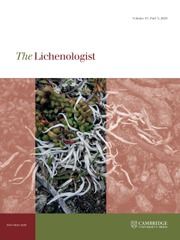Crossref Citations
This article has been cited by the following publications. This list is generated based on data provided by
Crossref.
Esslinger, Theodore L.
2000.
Recent Literature on Lichens—177*.
The Bryologist,
Vol. 103,
Issue. 2,
p.
406.
Arup, Ulf
2002.
Protocols in Lichenology.
p.
392.
Divakar, Pradeep K.
Crespo, Ana
Blanco, Oscar
and
Lumbsch, H. Thorsten
2006.
Phylogenetic significance of morphological characters in the tropical Hypotrachyna clade of parmelioid lichens (Parmeliaceae, Ascomycota).
Molecular Phylogenetics and Evolution,
Vol. 40,
Issue. 2,
p.
448.
Crespo, Ana
Lumbsch, H. Thorsten
Mattsson, Jan-Eric
Blanco, Oscar
Divakar, Pradeep K.
Articus, Kristina
Wiklund, Elisabeth
Bawingan, Paulina A.
and
Wedin, Mats
2007.
Testing morphology-based hypotheses of phylogenetic relationships in Parmeliaceae (Ascomycota) using three ribosomal markers and the nuclear RPB1 gene.
Molecular Phylogenetics and Evolution,
Vol. 44,
Issue. 2,
p.
812.
Lumbsch, H. Thorsten
Mangold, Armin
Martín, María P.
and
Elix, John A.
2008.
Species recognition and phylogeny of Thelotrema species in Australia (Ostropales, Ascomycota).
Australian Systematic Botany,
Vol. 21,
Issue. 3,
p.
217.
Lumbsch, H Thorsten
Hipp, Andrew L
Divakar, Pradeep K
Blanco, Oscar
and
Crespo, Ana
2008.
Accelerated evolutionary rates in tropical and oceanic parmelioid lichens (Ascomycota).
BMC Evolutionary Biology,
Vol. 8,
Issue. 1,
Kruys, Asa
and
Wedin, Mats
2009.
Phylogenetic relationships and an assessment of traditionally used taxonomic characters in the Sporormiaceae (Pleosporales, Dothideomycetes, Ascomycota), utilising multi‐gene phylogenies.
Systematics and Biodiversity,
Vol. 7,
Issue. 4,
p.
465.
KANTVILAS, Gintaras
and
LUMBSCH, H. Thorsten
2009.
Meridianelia, a new genus in the Elixiaceae (Ascomycota) from Tasmania.
The Lichenologist,
Vol. 41,
Issue. 3,
p.
261.
THELL, Arne
HÖGNABBA, Filip
ELIX, John A.
FEUERER, Tassilo
KÄRNEFELT, Ingvar
MYLLYS, Leena
RANDLANE, Tiina
SAAG, Andres
STENROOS, Soili
AHTI, Teuvo
and
SEAWARD, Mark R. D.
2009.
Phylogeny of the cetrarioid core (Parmeliaceae) based on five genetic markers.
The Lichenologist,
Vol. 41,
Issue. 5,
p.
489.
Elix, John A.
Corush, Joel
and
Lumbsch, H.Thorsten
2009.
Triterpene chemosyndromes and subtle morphological characters characterise lineages in thePhyscia aipoliagroup in Australia (Ascomycota).
Systematics and Biodiversity,
Vol. 7,
Issue. 4,
p.
479.
Alastruey-Izquierdo, Ana
Hoffmann, Kerstin
de Hoog, G. Sybren
Rodriguez-Tudela, Juan Luis
Voigt, Kerstin
Bibashi, Evangelia
and
Walther, Grit
2010.
Species Recognition and Clinical Relevance of the Zygomycetous GenusLichtheimia(syn.Absidia Pro Parte,Mycocladus).
Journal of Clinical Microbiology,
Vol. 48,
Issue. 6,
p.
2154.
Amo de Paz, Guillermo
Lumbsch, H. Thorsten
Cubas, Paloma
Elix, John A.
and
Crespo, Ana
2010.
The genus Karoowia (Parmeliaceae, Ascomycota) includes unrelated clades nested within Xanthoparmelia.
Australian Systematic Botany,
Vol. 23,
Issue. 3,
p.
173.
Evans, Harry C.
Johnston, Peter R.
Park, Duckchul
Barreto, Robert W.
and
Soares, Dartanhã R.
2010.
Claviradulomyces, a new genus of Odontotremataceae from West African rainforest.
Fungal Biology,
Vol. 114,
Issue. 1,
p.
41.
Crespo, Ana
Ferencova, Zuzana
Pérez-Ortega, Sergio
Elix, John A.
and
Divakar, Pradeep K.
2010.
Austroparmelina, a new Australasian lineage in parmelioid lichens (Parmeliaceae, Ascomycota).
Systematics and Biodiversity,
Vol. 8,
Issue. 2,
p.
209.
SPRIBILLE, Toby
and
LUMBSCH, H. Thorsten
2010.
A new species of Elixia (Umbilicariales) from Greece.
The Lichenologist,
Vol. 42,
Issue. 4,
p.
365.
CZARNOTA, Paweł
and
GUZOW-KRZEMIŃSKA, Beata
2010.
A phylogenetic study of theMicarea prasinagroup shows thatMicarea micrococcaincludes three distinct lineages.
The Lichenologist,
Vol. 42,
Issue. 1,
p.
7.
NELSEN, Matthew P.
CHAVEZ, Natali
SACKETT-HERMANN, Erin
THELL, Arne
RANDLANE, Tiina
DIVAKAR, Pradeep K.
RICO, Víctor J.
and
LUMBSCH, H. Thorsten
2011.
The cetrarioid core group revisited (Lecanorales: Parmeliaceae).
The Lichenologist,
Vol. 43,
Issue. 6,
p.
537.
PAPONG, K.
KANTVILAS, G.
and
LUMBSCH, H. T.
2011.
Morphological and molecular evidence placesMaroninainto synonymy withProtoparmelia(Ascomycota:Lecanorales).
The Lichenologist,
Vol. 43,
Issue. 6,
p.
561.
Ekman, Stefan
and
Blaalid, Rakel
2011.
The Devil in the Details: Interactions between the Branch-Length Prior and Likelihood Model Affect Node Support and Branch Lengths in the Phylogeny of the Psoraceae.
Systematic Biology,
Vol. 60,
Issue. 4,
p.
541.
Schmitt, Imke
2011.
Evolution of Fungi and Fungal-Like Organisms.
p.
187.


